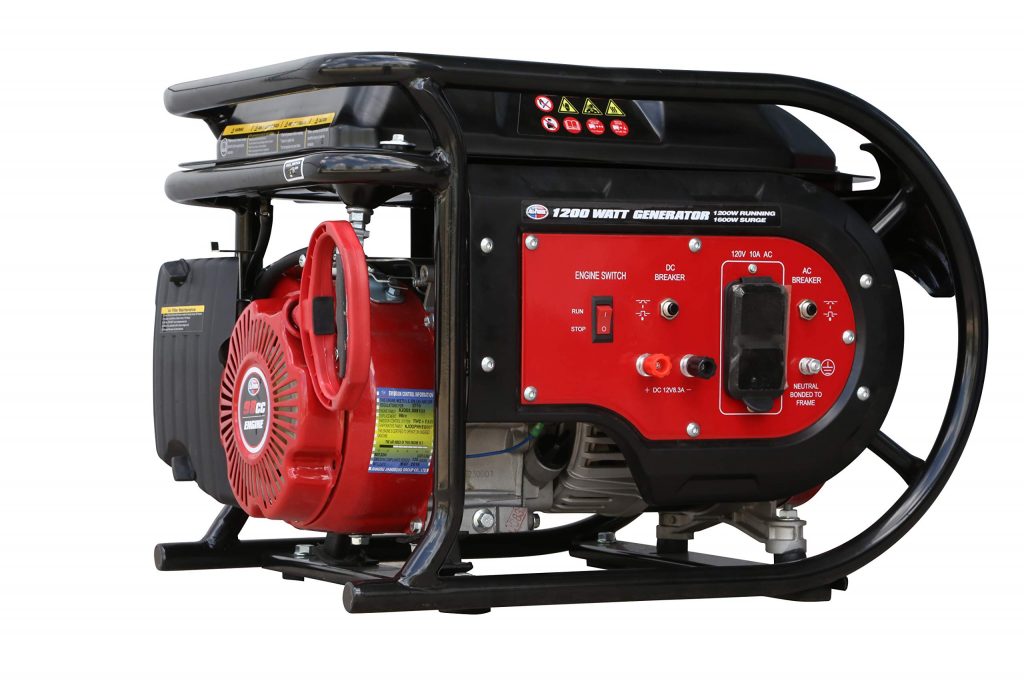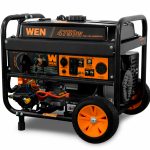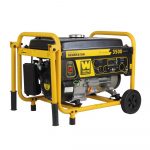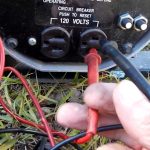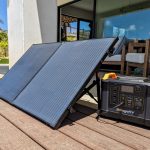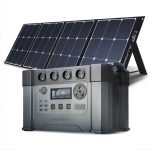A 1600 watt generator can provide enough power to run essential appliances and tools around the home or on a work site. It is suitable for running basic tools such as lights, drills, and other such tools for light construction and small home improvement projects. A 1800 watt generator can provide you with even more power, allowing you to run more tools and appliances for a longer period of time. It can power larger tools such as circular saws and table saws, as well as more powerful lights and other items that require more electrical output. It’s also suitable for running multiple items at the same time, such as a fridge and a television.
In addition, the 1800 watt generator can be used to power a small air conditioner, a microwave oven, and other such items that require a greater power output. It can also be used to run a sump pump in the event of a power outage, and is great for powering electrical equipment while camping or on the road. Overall, a 1800 watt generator can provide you with the necessary power to run more appliances and tools than a 1600 watt generator. With a 1800 watt generator, you can have the peace of mind that you can power multiple tools and items at the same time, without having to worry about running out of power.
Will a 1500 watt generator run a refrigerator?
A 1600 watt generator will provide enough power to run a range of appliances, including a refrigerator. The size and type of fridge you have will determine how much wattage it requires to run. Generally, a 1500 watt generator is sufficient to run most standard sized refrigerators, but a larger or more energy-efficient model may require more wattage. For safety reasons, it is important to ensure that the wattage of the generator is higher than the wattage needed for the fridge. If the wattage is too low, the generator could be overloaded and cause damage to the fridge.
It is also important to check the start-up wattage requirements of the refrigerator as some may need more wattage to start up than to run. This means a generator with a higher wattage may be needed if the fridge has a high start-up wattage requirement. In conclusion, a 1600 watt generator can run a refrigerator, but the wattage may be too low for some models. It is important to check the wattage requirements of the fridge before purchasing a generator to ensure that it is powerful enough to run the fridge.
Will a 1800 watt generator run a window air conditioner?
A 1600 watt generator will be able to power a variety of small appliances and tools, such as a small refrigerator, table saw, or drill. However, it may not be able to run a window air conditioner, as they typically require more power. A typical window air conditioner will require anywhere from 1,500 to 2,000 watts of electricity to operate, which means that a 1600 watt generator may not be able to power it. Therefore, a 1800 watt generator would be required to run a window air conditioner. A 1800 watt generator can provide enough power to run a window air conditioner, depending on the model and its energy efficiency.
It should also be noted that higher wattage generators are needed to start larger air conditioners. Ideally, the wattage of the generator should be at least 25 percent higher than the rated power of the window air conditioner. This will ensure that the generator can provide enough power to start the unit and keep it running. Overall, a 1800 watt generator can run a window air conditioner if the wattage of the generator is at least 25 percent higher than the rated power of the air conditioner. It is important to check the wattage and energy efficiency of the air conditioner before purchasing a generator to make sure it is powerful enough for the job.
How many watts do I need to run my house on a generator?
If you have a 1600 watt generator, you can run many small appliances in your home. It’s not enough to run major appliances like your AC or fridge, however. To run those items, you’ll need a more powerful generator that produces at least 5000 watts. A 1600 watt generator is sufficient to run a few small appliances at a time. This includes lights, a television, a small fan, and a laptop, as long as they don’t draw too much power.
It can also be used to charge cell phones and other small electronics. If you are looking to power your entire home with a generator, you’ll need to calculate the total wattage you need. Check the labels of all the appliances you want to run and add up all their wattage. This should give you an idea of how many watts you will need to run them. In general, it is best to overestimate the wattage you need for a generator. This will ensure that you have enough power to run all the appliances you need, without overloading the generator. To sum up, you’ll need at least 5000 watts or more to run all the appliances in a typical household. A 1600 watt generator is suitable for running a few small items, but it won’t be able to power your entire home.
How long will a 1500 watt generator run?
A 1600 watt generator can provide power for a variety of activities, from camping to powering tools. However, a smaller 1500 watt generator may not be capable of running some of the same appliances. Generally, a 1500 watt generator will run for about 4 to 5 hours on one tank of fuel. This will depend on what appliances are connected as well as the power requirement of the device. It is also important to take into account the load of the appliances, as this will affect the run time.
When selecting a generator, it is recommended to consider the wattage requirements of the appliances that will be used. If a higher wattage is needed, a 1600 watt generator should be considered instead of a 1500 watt generator. This will provide more power and the ability to run more appliances. It is important to remember that the amount of time a generator will run will vary depending on the size and type of generator, as well as the wattage requirements of the appliances being used. A 1500 watt generator will provide enough power for smaller items, but may not be suitable for larger appliances. A 1600 watt generator is a better option for larger items, providing more power and longer run times.
How big of a generator do I need to run a refrigerator?
A 1600 watt generator can be used to power a refrigerator. However, the exact size generator you will need will depend on the power requirements of your refrigerator. Most standard sized refrigerators require at least 700-1000 watts to run. If your refrigerator is larger, or has additional features, you may need a generator that can provide up to 1600 watts or more. It is important to check the wattage requirements of your refrigerator before purchasing a generator.
If the wattage is too low, the appliance may not run properly. Additionally, you should make sure your generator is rated to handle the surge load of the refrigerator when it is initially turned on. To ensure your refrigerator runs without problems, it is best to select a generator that has a higher wattage rating than the refrigerator requires. This will help to avoid potential power fluctuations and provide the best performance. In conclusion, if you have a standard refrigerator, a 1600 watt generator should be enough to power it. However, if your refrigerator is larger or has extra features, you may need a generator that can provide more wattage. It is important to check the wattage of your refrigerator before buying a generator to make sure you get the right size.
How many watts does it take to run a 3 bedroom house?
It is important to consider what it takes to power a 3 bedroom house. The average 3 bedroom house requires a lot of energy to run, and a generator needs to be able to power all of the necessary appliances. Depending on the size of the house and the appliances, the total wattage required can range from 5000 to 15000 watts. A 1600 watt generator is not powerful enough to run a 3 bedroom house, as it is only capable of powering smaller items such as lights, televisions, and computers. It is important to keep in mind that the wattage required for a 3 bedroom house can vary greatly depending on the items that need to be powered.
For example, if the house requires an air conditioning unit, the wattage can increase drastically. Also, the wattage required to power a dishwasher or washing machine is much higher than a lightbulb. It is important to calculate exactly how many watts are required to power the entire house before purchasing a generator. In conclusion, a 1600 watt generator is not powerful enough to run a 3 bedroom house, as it is not able to provide enough power to all of the necessary appliances and electronics. To determine the exact wattage required, it is important to calculate the wattage of all the items that will be powered by the generator.
How many watts is a normal house?
A normal house typically uses up to 1600 watts of power. This means that a 1600 watt generator can power a normal house without any issues. It is an ideal choice for those looking for a generator that can run most of the appliances in their home. This type of generator can provide power to a wide range of home appliances, from lights and televisions to refrigerators and air conditioning systems. It can also be used to run other appliances such as a washer and dryer, microwave oven and toaster.
The amount of power that a generator can provide depends on its size and capacity. A 1600 watt generator can provide enough power to maintain the normal functioning of a typical house. It is important to note that the performance of the generator may vary depending on the type of appliances being used. To ensure that the generator is working efficiently, it is important to follow the manufacturer’s guidelines for proper maintenance and use. Regularly checking the oil and fuel levels, and keeping the generator clean, are essential steps to maintain its performance. In conclusion, a 1600 watt generator is an efficient and reliable option that can power a normal house. With proper maintenance, it can provide power to most home appliances, making it a great choice for those looking for an affordable and reliable source of power.
How many watts is a typical house?
A typical house will use around 1,500 to 3,000 watts of power. This means that a 1600 watt generator will be able to run many of the basic appliances and electronics in a typical home. Things like lights, a refrigerator, a washing machine, and a microwave may be able to run off the generator. However, larger appliances, such as air conditioners and electric stoves, will require more power and thus won’t be able to run off a 1600 watt generator. It is important to note that the wattage for a house is often dependent on the size of the home, the number of people living in it, and the types of appliances being used.
For example, a home with a large air conditioner will likely require more wattage than a home without one. It is also important to remember that generators are rated based on their running wattage, not their starting wattage. This means that a 1600 watt generator may only be able to produce up to about 1200 watts of running power. In conclusion, a 1600 watt generator is capable of running many basic appliances in a typical house, but it may not be able to run larger appliances that require more wattage. It is important to consider the size of your home and the power requirements of your appliances when selecting a generator.
Can a 1800 watt generator run a refrigerator?
A 1600 watt generator can power a range of small appliances, such as a refrigerator, a microwave, or a small TV. However, the wattage of a generator will determine the maximum size of appliance that can be powered. For a refrigerator, a 1600 watt generator is adequate for a small unit, such as a dorm-style fridge. However, if you have a full-sized refrigerator, you will need a generator with a higher wattage, such as a 1800 watt generator. A 1800 watt generator can handle the power load of a large refrigerator, as long as the wattage of the fridge does not exceed 1800 watts.
It is important to check the wattage of the refrigerator before purchasing a generator, to ensure that the generator can handle the load. Generators are an excellent way to keep your home running during power outages, so it is important to select the right one. A 1800 watt generator can provide enough power to run a full-sized refrigerator, making it a great choice for home emergency use. It is also important to make sure that the generator is properly maintained, to ensure that it is working efficiently and safely. With the right generator and proper maintenance, you can be sure that your refrigerator will stay powered during a power outage.
Can a 2000 watt generator run a house?
A 2000 watt generator is typically large enough to power many of the essential electric appliances in a home – such as a refrigerator, sump pump, and furnace. It is also capable of powering some small appliances, such as a TV, laptop, or lights. However, a 2000 watt generator is not typically enough to power the whole house and run multiple high-powered appliances at once. For comparison, a 1600 watt generator is capable of powering only a few small appliances. It is usually not suitable for running larger home appliances, such as a TV, refrigerator, sump pump, or furnace.
In other words, a 1600 watt generator won’t be able to power your entire home. Ultimately, a 2000 watt generator is a better choice for running a house than a 1600 watt generator. It is more powerful, and capable of powering a wider variety of appliances. However, it’s important to note that a 2000 watt generator is still not powerful enough to power a whole house and multiple high-powered appliances at once.
Can I run AC on 2000 watt generator?
A 1600 watt generator will not be able to run an air conditioner. Generators usually have a starting wattage requirement far higher than they can sustain over time. In order to run an air conditioner, you would need at least a 2000 watt generator. This is due to the high wattage required to start the compressor motor when the AC first is turned on. Since a 2000 watt generator can run an air conditioner, it is important to make sure it has enough wattage for the size of air conditioner you want to run.
Most residential air conditioners require at least 2000 to 3000 watts to start and run. If you need additional power for other appliances, you will need to get a generator with higher wattage. Additionally, make sure the generator has a high enough power rating for the air conditioner. This is important because you need to ensure that the generator can support the air conditioner’s power needs without tripping. In conclusion, a 1600 watt generator won’t be powerful enough to run an air conditioner. You will need at least a 2000 watt generator to make sure the air conditioner runs correctly and that you have enough power to run other appliances.
How many amps does a 1800 watt generator produce?
A 1800 watt generator produces about 15 amps of electricity. 1500 watts is the equivalent of about 12.5 amps, so this generator will provide a bit more power than a 1600 watt generator. What can you run with a 1600 watt generator? It depends on how much power the appliance or device needs. Some small appliances, such as a toaster or coffee maker, can be powered by a 1600 watt generator. It could also power a small window air conditioner, or several lights and a TV.
However, a 1800 watt generator can do more than a 1600 watt generator. It can run power tools, like a table saw or electric drill. It is enough to run a small refrigerator, or a few more lights and small electronics. Overall, a 1800 watt generator is a great choice if you need a lot of power for your appliances and tools. It can provide a reliable source of electricity for your home, whether it’s for daily use or emergency situations.
Is 1800 watts too much for outlet?
When it comes to how much wattage a generator can handle, the answer is that a 1600 watt generator can handle up to 1800 watts being drawn from the outlet. This means that if you’re running a 1600 watt generator, it won’t overload the outlet if you draw up to 1800 watts from it. However, it’s important to note that the wattage of appliances you’re running should not exceed 1600 watts. This is because exceeding the wattage limit can cause the generator to overheat and potentially damage the generator and the appliances you’re running. If you plan to run multiple appliances off the generator, it’s important to calculate the total wattage of the appliances you plan to use in order to ensure that you don’t exceed the limit.
For example, if you plan to run a 600 watt refrigerator, a 500 watt air conditioner, and a 400 watt TV, then the total wattage being drawn is 1600 watts, which is the limit of the generator. In conclusion, while 1800 watts is too much for a 1600 watt generator, it’s still possible to draw up to 1600 watts from the outlet without overloading it. As long as you keep the total wattage of the appliances within the 1600 watt limit, you can use the generator safely.
Can a 1800 watt generator run a space heater?
A 1600 watt generator is not quite powerful enough to run a space heater, but it may be able to power a few other small appliances in your home. A 1800 watt generator could run a space heater, depending on the size and efficiency of the heater. Generally, it’s recommended to have a generator with around 3300 watts to run a space heater safely and efficiently. You should always check the and total wattage of the devices you plan to use with the generator to make sure it can keep up with their combined power demands. Space heaters need a lot of power, and it’s important to make sure your generator can handle running one.
Otherwise, you may end up with an overloaded generator that won’t be able to keep up with all your devices. If you plan to run a space heater with a generator, it’s best to invest in a model that can provide enough power and has safety features to prevent overloads. 1800 watts should be able to run a small space heater, but it’s always best to err on the side of caution and get a generator that is more powerful than you need.
How big of a generator do I need to run a house?
A 1600 watt generator can certainly be used to run a house, however, it may not be the most cost-effective option. Depending on the size of your home, you may need a generator capable of providing at least 4,000 to 5,000 watts of power or more in order to effectively run all of the electrical appliances in your home. It is important to consider the appliances you will be running while the generator is in use. Refrigerators, air conditioners, sump pumps and other appliances that rely on high wattage can require a generator that is much larger than 1600 watts. You should also consider the number of appliances you will be running simultaneously.
If you are planning to run multiple large appliances at once, you may need to invest in an even larger generator. When deciding on the size of generator you need, it is important to factor in the capacity of the generator and the size of the motor. While a 1600 watt generator may be able to run a few of your small appliances, it may not have enough power to run a large motor. Overall, the size of generator you need to run a house depends on the size of your home, the number of appliances you plan to run, and their wattage requirements. It is important to consider these factors when deciding on the size of generator you need.
How many watts do you need to power a 3 bedroom house?
A 1600 watt generator is powerful enough to power a 3 bedroom house. To work out how many watts you need, you should consider the size of the house, the type of appliances you’re running, and your electricity usage. Generally speaking, a 3 bedroom house requires around 5,500 watts to run the basics such as lights, a fridge, a boiler and other small appliances. However, if you’re running things such as a clothes dryer, an oven, and a washing machine, this figure may increase significantly. In terms of a 1600 watt generator, you can expect to power 1-2 lights, a small fridge, and a few other small appliances.
It won’t be able to power all the appliances in a 3 bedroom house, but it can certainly help in times of power outages and emergencies. When purchasing a generator, it’s important to consider the wattage you need to power your home. It’s also important to make sure you’re not overloading the generator, as this can cause serious damage to the unit. A 1600 watt generator is an excellent choice for a 3 bedroom house, as it provides enough power to cover the basics in a power outage. It’s important to remember that you may need more power if you’re running larger appliances in your home.
Can you run an AC on a 1800 watt generator?
A 1600 watt generator is suitable for running certain home appliances, such as lights and a refrigerator. However, it may not be enough to power larger appliances, like an air conditioner. An air conditioner usually requires around 1800 watts of power to run, so a 1600 watt generator likely won’t be able to provide enough power to make it operational. It is possible to run an AC on a 1800 watt generator, but you will need to ensure that the generator can provide enough sustained power to handle the AC’s needs. This means that the generator should have a peak power rating of 2000 watts or higher. It’s important to remember that a generator can only produce a certain amount of power, so running multiple large appliances at once on a 1800 watt generator will likely not be possible. In conclusion, it is possible to run an AC on a 1800 watt generator, but it is important to take into consideration the generator’s capabilities and the total load that it can handle.
How much power can a patriot power generator 1800 handle?
With this generator, you can even run pumps, power tools, and other tools that require more power. When it comes to what a 1600 watt generator can handle, the Patriot Power Generator 1800 can easily handle it. It is capable of running a variety of appliances and tools that require 1600 watts of power or less. For example, you can easily power a small refrigerator or electric stove with this generator. You can also power a saw, drill, or compressor with the generator.
The Patriot Power Generator 1800 is also equipped with a variety of safety features. It has an overload protection feature that shuts off the generator if it is overloaded. This helps to ensure your safety and prevent damage to your appliances and tools. It also has a low oil shutoff feature that will shut off the generator if the oil level is too low. In conclusion, the Patriot Power Generator 1800 is capable of handling up to 1800 watts of power and can easily handle what a 1600 watt generator is capable of. It is a reliable and safe generator that is suitable for powering a wide range of appliances and tools. With its safety features, you can feel confident that you are safe and that your appliances and tools are protected.
What is a higher wattage generator?
It is great for powering small to medium-sized appliances such as microwaves, refrigerators, freezers, and even air conditioners. It can also be used to power small tools such as drills, saws and other power tools. This generator is designed to provide enough power to run multiple items simultaneously. It is great for camping, tailgating, and powering essential items in an emergency. It is also an economical choice, as it produces a high amount of power for a low cost.
The 1600 watt generator is fuel efficient and produces a clean and consistent power output. This makes it reliable and safe for powering home and business appliances. This generator is also easy to start, and it is able to run for long periods of time without interruption. Overall, a 1600 watt generator is a useful and versatile tool for a variety of applications. Whether you need to power essential items in an emergency, or you simply want to keep your home or business appliances running, a 1600 watt generator is a great choice. It is reliable, cost-effective, and provides a consistent power output.
How many watts can a generator handle?
A 1600 watt generator can generate up to 1600 watts of power. This is enough to provide power to a variety of devices and appliances. For example, a 1600 watt generator can power a microwave, a television, a toaster, and most small kitchen appliances. However, it may not be powerful enough to run large appliances such as an air conditioner or a fridge. When using a generator, it is important to remember that the maximum power it can output is 1600 watts.
If you try to draw more power than what a generator is designed to handle, it will become overloaded and potentially stop working. Generator wattage can be used to determine what kind of devices and appliances it can run. With a 1600 watt generator, you will be able to power a variety of smaller devices and appliances. However, it may not be able to handle larger appliances such as air conditioners or refrigerators. Overall, a 1600 watt generator can handle up to 1600 watts of power, which is enough for powering a variety of smaller appliances, but may not be enough for larger appliances. Therefore, it is important to make sure that the generator is not overloaded and to check the wattage of any devices and appliances before attempting to power them with a generator.
Can you run your TV off a generator?
It can provide enough power to run a wide range of appliances, including your TV. Yes, it is possible to run your TV off of a generator. Depending on the size and model of your television, you may need a generator with a higher wattage in order to power it properly. A 1600 watt generator should be able to handle the job if the TV is not too large. However, it is important to note that running a TV off of a generator can be dangerous.
The generator should be kept a safe distance away from the television and other devices, and the TV should be connected to the generator using only approved extension cords and outlets. In addition, the generator should be adequately ventilated so that the TV does not overheat and cause a fire. It is also important to make sure that the generator is regularly maintained and checked for any malfunctioning parts. To sum up, it is possible to run your TV off of a 1600 watt generator, but it is important to take the necessary safety precautions. With proper care and maintenance, running a TV off of a generator can be safe and reliable.
Will a surge protector protect my TV when using a generator?
Generators can produce fluctuating voltage levels, which can cause damage to your TV. A surge protector will help regulate the power coming from the generator and protect your TV from any sudden increases in voltage. When using a generator to power your TV, make sure the wattage of your generator is higher than the wattage of the appliances you plan to use with it. A 1600 watt generator should be able to power most TVs, but it’s always best to double check the wattage of your TV before attempting to use it with a generator. In addition to using a surge protector, it’s also a good idea to check the condition of your generator’s cords and outlets before connecting them to your TV.
If you notice any frayed cords or loose outlets, replace them before continuing with your setup. It’s also important to make sure your generator is properly grounded when powering your TV. If your generator is not grounded correctly, it can cause a surge of electricity, which can damage your TV. Finally, make sure to switch off the generator after you’re done using it. This will ensure that your TV is not exposed to any more power spikes from the generator. By following these steps, you can rest assured that your TV will stay safe when using a 1600 watt generator.
Can a battery backup power a TV?
A 1600 watt generator can provide enough power to run a television on a battery backup. This means that the television will still be able to run even if there is a power outage. It is important to consider, however, that different types of televisions require different amounts of wattage in order to operate, so it is important to make sure that the wattage of the generator is sufficient for the television. Additionally, it is important to consider the other electronics that may be running in the home when determining if a 1600 watt generator can power a television. If other electronics are also running at the same time, the wattage of the generator may be insufficient, which can cause the television to shut down.
Another factor to consider is the size of the battery backup. Depending on the size of the battery, it may not be able to power the television for a long period of time. It is important to make sure that the battery is large enough to power the television for at least a few hours in case of a power outage. In conclusion, a 1600 watt generator can power a television on a battery backup, however, it is important to consider the wattage of the television, other electronics that may be running in the home, and the size of the battery in order to make sure the television can be powered for an adequate amount of time.
Will a 1000 watt generator run a TV?
A 1600 watt generator can run a variety of household appliances, including a TV. A 1000 watt generator is not powerful enough to run most TVs. However, a 1000 watt generator can power smaller appliances, such as a toaster, blender, or vacuum. In some cases, it can even run a laptop. If you need to power a TV, you should choose a generator with at least 1500 watts of power.
This should provide enough energy to run a television as well as other appliances. In addition to the amount of power, you should also consider the size of the generator when shopping for a model to run your TV. Some generators are too large or heavy to be easily moved, so it’s important to check the weight and size of the model you’re considering. Overall, if you want to run a TV with your generator, you should choose a model with at least 1600 watts of power. This should provide enough energy to run a television along with other household appliances.
What will a 2000 watt generator run?
A 2000 watt generator will run almost everything that a 1600 watt generator can power. It can typically power a wide range of appliances and tools, such as refrigerators, microwaves, air conditioners, freezers, power tools, and more. Most of the time, a 2000 watt generator will have enough power to run your household appliances. For a 2000 watt generator, you can expect it to be able to power any light duty equipment, such as a vacuum cleaner, a laptop, and a TV. It will also be able to operate most other devices, such as a power drill, a sander, and a circular saw.
A 2000 watt generator is perfect for camping trips, as it can easily provide power to all of your essential appliances and tools. It can also provide a reliable source of energy for outdoor events and parties. In addition, a 2000 watt generator can also be used to provide emergency power in the event of a power outage. It is a great option for homeowners who want to have a back up electricity source on hand. Overall, a 2000 watt generator is a great choice for anyone who needs a reliable source of power. It can easily power a variety of appliances, tools, and electronic devices while also providing a reliable source of emergency power.
How many watts does a fridge use for generator?
A 1600 watt generator has the capacity to power a range of home appliances including a fridge. The amount of watts that a fridge uses for a generator will depend on the size and type of fridge. Generally, a standard-sized fridge that uses a compressor unit will use around 400-600 watts depending on the age, make and model. For example, a fridge with an energy efficiency rating of A++ will use less electricity than one with a rating of A-. However, the wattage required to power a fridge can also be affected by external factors.
For instance, a fridge operating in a hot environment may use more power than usual. Also, the wattage can vary depending on the amount of time the fridge is running. Overall, a 1600 watt generator is more than enough to power a fridge. However, if you are using other home appliances in conjunction with the fridge, you may need to opt for a generator with a higher wattage.
What size generator do I need for a refrigerator and TV?
If you are looking for a generator to power a refrigerator and a television, a 1600 watt generator should be sufficient. This size generator can provide enough energy to power a refrigerator or a TV set or both. You will need to make sure the total wattage of both appliances does not exceed the 1600 watt capacity of the generator. To determine the exact wattage of your refrigerator and TV, please refer to their manufacturer’s instructions. Generally, a standard refrigerator will require around 825 watts of power, while a standard TV typically needs around 200 watts.
In addition, you should also consider the power factor of the devices you are running. This is the amount of electricity that is actually available after accounting for the inefficiencies of the generator. This will affect the total wattage of the appliances you are running. When setting up your generator, make sure you have enough fuel and the right size generator for your appliances. A 1600 watt generator will provide enough power for a refrigerator and a TV, but you should make sure the total wattage of your appliances does not exceed this limit.
What is the difference between a generator and an inverter generator?
A generator and an inverter generator are two different types of power sources. A generator is a device that produces electricity from an outside source, like a fuel or solar energy. An inverter generator, on the other hand, converts electricity from one type of energy source, such as gasoline, to an alternating current (AC) for use in devices like computers or lights. A 1600 watt generator will produce enough power to run many small household appliances such as a television, microwave, and laptop. It can also power tools like a chainsaw or leaf blower.
Generators are typically used in situations where power is not readily available, such as camping trips, or in emergency situations when the power goes out. Inverter generators, on the other hand, are usually used to provide a steady supply of electricity in places where there is no access to the power grid. The main difference between a generator and an inverter generator is that an inverter generator is a more efficient and reliable power source. It produces cleaner power that is more consistent and is quieter than a generator. It also has a longer lifespan than a generator, making it a better choice for most people. In conclusion, a 1600 watt generator can provide enough power to run small household appliances and tools, while an inverter generator is a more efficient and reliable source of power for situations where power is not readily available.
What can I run on a 2000 watt generator?
A 1600 watt generator can provide enough power to run small electronics like lights, cell phones, and laptops. It can also be used to power small appliances such as a toaster, coffee maker, and microwave. With a 2000 watt generator, you can run more powerful tools such as electric saws, drills, and grinders. You can also use it to run more energy-intensive appliances like a refrigerator, air conditioner, and washing machine. It is also capable of powering small electric motors such as those used in power tools and lawn mowers. Additionally, you can connect several appliances to the generator at once, allowing you to use multiple tools and appliances at the same time. With a 2000 watt generator, you can get the power you need to get any job done.
